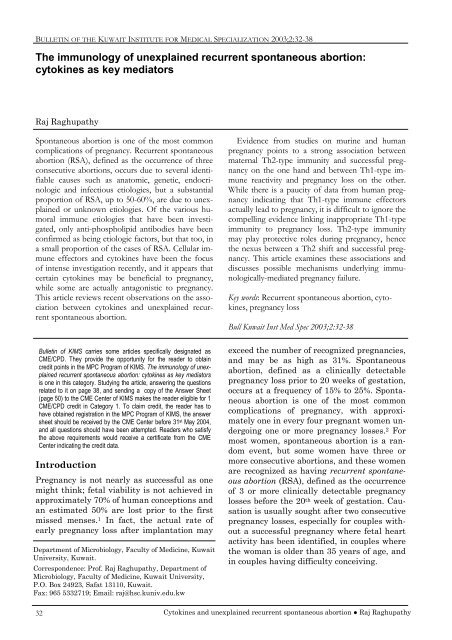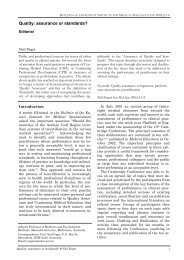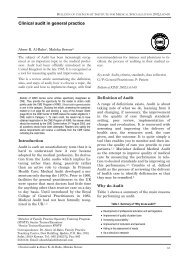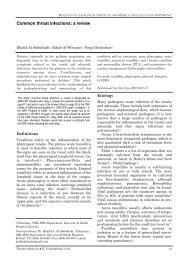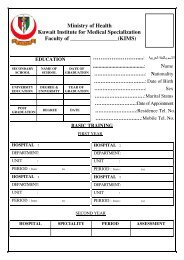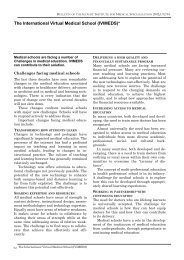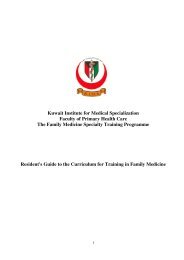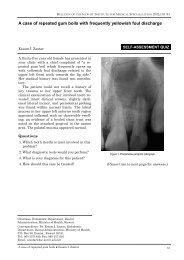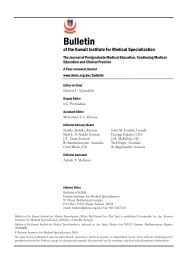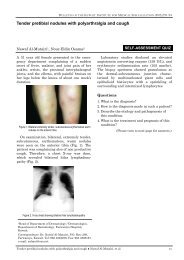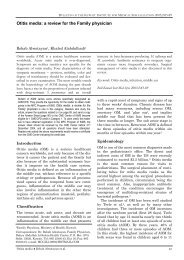The immunology of unexplained recurrent spontaneous abortion
The immunology of unexplained recurrent spontaneous abortion
The immunology of unexplained recurrent spontaneous abortion
- No tags were found...
You also want an ePaper? Increase the reach of your titles
YUMPU automatically turns print PDFs into web optimized ePapers that Google loves.
BULLETIN OF THE KUWAIT INSTITUTE FOR MEDICAL SPECIALIZATION 2003;2:32-38<br />
<strong>The</strong> <strong>immunology</strong> <strong>of</strong> <strong>unexplained</strong> <strong>recurrent</strong> <strong>spontaneous</strong> <strong>abortion</strong>:<br />
cytokines as key mediators<br />
Raj Raghupathy<br />
Spontaneous <strong>abortion</strong> is one <strong>of</strong> the most common<br />
complications <strong>of</strong> pregnancy. Recurrent <strong>spontaneous</strong><br />
<strong>abortion</strong> (RSA), defined as the occurrence <strong>of</strong> three<br />
consecutive <strong>abortion</strong>s, occurs due to several identifiable<br />
causes such as anatomic, genetic, endocrinologic<br />
and infectious etiologies, but a substantial<br />
proportion <strong>of</strong> RSA, up to 50-60%, are due to <strong>unexplained</strong><br />
or unknown etiologies. Of the various humoral<br />
immune etiologies that have been investigated,<br />
only anti-phospholipid antibodies have been<br />
confirmed as being etiologic factors, but that too, in<br />
a small proportion <strong>of</strong> the cases <strong>of</strong> RSA. Cellular immune<br />
effectors and cytokines have been the focus<br />
<strong>of</strong> intense investigation recently, and it appears that<br />
certain cytokines may be beneficial to pregnancy,<br />
while some are actually antagonistic to pregnancy.<br />
This article reviews recent observations on the association<br />
between cytokines and <strong>unexplained</strong> <strong>recurrent</strong><br />
<strong>spontaneous</strong> <strong>abortion</strong>.<br />
Evidence from studies on murine and human<br />
pregnancy points to a strong association between<br />
maternal Th2-type immunity and successful pregnancy<br />
on the one hand and between Th1-type immune<br />
reactivity and pregnancy loss on the other.<br />
While there is a paucity <strong>of</strong> data from human pregnancy<br />
indicating that Th1-type immune effectors<br />
actually lead to pregnancy, it is difficult to ignore the<br />
compelling evidence linking inappropriate Th1-type<br />
immunity to pregnancy loss. Th2-type immunity<br />
may play protective roles during pregnancy, hence<br />
the nexus between a Th2 shift and successful pregnancy.<br />
This article examines these associations and<br />
discusses possible mechanisms underlying immunologically-mediated<br />
pregnancy failure.<br />
Key words: Recurrent <strong>spontaneous</strong> <strong>abortion</strong>, cytokines,<br />
pregnancy loss<br />
Bull Kuwait Inst Med Spec 2003;2:32-38<br />
Bulletin <strong>of</strong> KIMS carries some articles specifically designated as<br />
CME/CPD. <strong>The</strong>y provide the opportunity for the reader to obtain<br />
credit points in the MPC Program <strong>of</strong> KIMS. <strong>The</strong> <strong>immunology</strong> <strong>of</strong> <strong>unexplained</strong><br />
<strong>recurrent</strong> <strong>spontaneous</strong> <strong>abortion</strong>: cytokines as key mediators<br />
is one in this category. Studying the article, answering the questions<br />
related to it on page 38, and sending a copy <strong>of</strong> the Answer Sheet<br />
(page 50) to the CME Center <strong>of</strong> KIMS makes the reader eligible for 1<br />
CME/CPD credit in Category 1. To claim credit, the reader has to<br />
have obtained registration in the MPC Program <strong>of</strong> KIMS, the answer<br />
sheet should be received by the CME Center before 31 st May 2004,<br />
and all questions should have been attempted. Readers who satisfy<br />
the above requirements would receive a certificate from the CME<br />
Center indicating the credit data.<br />
Introduction<br />
Pregnancy is not nearly as successful as one<br />
might think; fetal viability is not achieved in<br />
approximately 70% <strong>of</strong> human conceptions and<br />
an estimated 50% are lost prior to the first<br />
missed menses. 1 In fact, the actual rate <strong>of</strong><br />
early pregnancy loss after implantation may<br />
Department <strong>of</strong> Microbiology, Faculty <strong>of</strong> Medicine, Kuwait<br />
University, Kuwait.<br />
Correspondence: Pr<strong>of</strong>. Raj Raghupathy, Department <strong>of</strong><br />
Microbiology, Faculty <strong>of</strong> Medicine, Kuwait University,<br />
P.O. Box 24923, Safat 13110, Kuwait.<br />
Fax: 965 5332719; Email: raj@hsc.kuniv.edu.kw<br />
exceed the number <strong>of</strong> recognized pregnancies,<br />
and may be as high as 31%. Spontaneous<br />
<strong>abortion</strong>, defined as a clinically detectable<br />
pregnancy loss prior to 20 weeks <strong>of</strong> gestation,<br />
occurs at a frequency <strong>of</strong> 15% to 25%. Spontaneous<br />
<strong>abortion</strong> is one <strong>of</strong> the most common<br />
complications <strong>of</strong> pregnancy, with approximately<br />
one in every four pregnant women undergoing<br />
one or more pregnancy losses. 2 For<br />
most women, <strong>spontaneous</strong> <strong>abortion</strong> is a random<br />
event, but some women have three or<br />
more consecutive <strong>abortion</strong>s, and these women<br />
are recognized as having <strong>recurrent</strong> <strong>spontaneous</strong><br />
<strong>abortion</strong> (RSA), defined as the occurrence<br />
<strong>of</strong> 3 or more clinically detectable pregnancy<br />
losses before the 20 th week <strong>of</strong> gestation. Causation<br />
is usually sought after two consecutive<br />
pregnancy losses, especially for couples without<br />
a successful pregnancy where fetal heart<br />
activity has been identified, in couples where<br />
the woman is older than 35 years <strong>of</strong> age, and<br />
in couples having difficulty conceiving.<br />
32<br />
Cytokines and <strong>unexplained</strong> <strong>recurrent</strong> <strong>spontaneous</strong> <strong>abortion</strong> ● Raj Raghupathy


